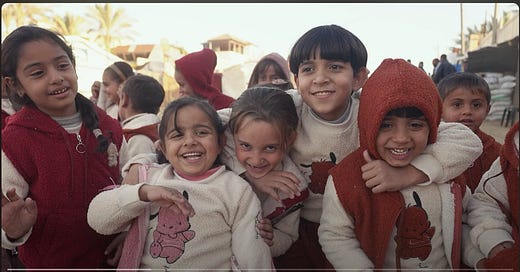We light these lights for Gaza
This past Wednesday, January 1, was the eighth night of Hanukkah, Judaism’s Festival of Lights, which commemorates the rededication of the Temple in Jerusalem in 164 BCE and the oil that miraculously burned for eight days. January 1 was also New Year’s Day, which marked the end of a week of celebration that began on December 25, Christmas Day.
In that same week, six Palestinian children froze to death in Gaza, including 20-day-old Jumaa al-Batran and his twin brother, 21-day-old Ali al-Batran. While I was drafting this essay on Thursday, Israel killed more than 40 Palestinians, including brothers Ahmed, Mohammed, and Abdul Rahman al-Bardawil (aged seven, 11, and 13), who “were hit by shrapnel as they slept in their family’s tent.”
Over the past weeks, I have wished family, friends, and delivery people “Happy holidays,” “Merry Christmas,” and “Happy New Year.” My wishes were sincere, as were the wishes I received. But Gaza is ever present in me, and my conscience stumbles on the words “Merry” and “Happy.” This Tuesday begins the sixteenth month of the U.S./Israeli genocidal assault on 2.3 million Palestinians. Photographs of the destruction bring to mind a passage (to be honest, the only passage I understand) from “The Waste Land” by T.S. Eliot:
What are the roots that clutch, what branches grow Out of this stony rubbish? Son of man, You cannot say, or guess, for you know only A heap of broken images, where the sun beats, And the dead tree gives no shelter, the cricket no relief, And the dry stone no sound of water. Only There is shadow under this red rock, (Come in under the shadow of this red rock), And I will show you something different from either Your shadow at morning striding behind you Or your shadow at evening rising to meet you; I will show you fear in a handful of dust.
Rabbi Brent Rosen of Tzedek Chicago, an anti-Zionist congregation deeply involved in Palestine solidarity, called on Jews to honor the memories of those whom Israel has killed, injured, imprisoned, and driven into exile by “rededicating ourselves to a Judaism beyond Zionism and Jewish supremacy; to a world beyond militarism and genocide.” Referring to the lighting of the candles on each night of Hanukkah, he offered this poem:
We light these lights for Gaza
We light these lights
for the instigators and the refusers,
the obstinate and unyielding,
for the ones who keep going
the ones who keep living
the ones who won’t bow down.
We light these lights
for the sparks that guide us on
through the dead of night,
for the darkness that swaddles us
in its soft embrace, until we inevitably emerge
into life renewed.
We light these lights
for the foundation that remains
after all strength has ebbed away,
for the steadfast knowledge
even as the bombs fall over
and over from the sky,
that the impunity of the powerful
cannot last forever.
These lights we light tonight
will never be used for any other purpose
but to proclaim the miracle
of this truth:
it is not by might nor by cruelty
but by a love that burns relentlessly
that this broken world
will be redeemed.Whether you believe the light is the human spirit or the Holy Spirit or a bit of both, we are the light. Each of us, and all of us together. And where there is light, there is love and joy. Even in Gaza where, amid a genocide, a family celebrates the birthday of a child, adults create makeshift classrooms for children, women exchange bread and warm water, and the Middle East Children’s Alliance, one of the organizations providing humanitarian aid in Gaza, releases this video:
We are the light in the long, dark tunnel that is our broken world, and at the end of that tunnel is the world we imagine.
Nikki Giovanni, a queer African American woman poet, who died on December 9, was teaching at Virginia Tech on April 16, 2007 when Seung-Hui Cho, an undergrad, killed 32 people and wounded 17 others before committing suicide. At a campus-wide convocation to mourn that horrible day, Giovanni urged those assembled, “We are strong enough to stand tall tearlessly. We are brave enough to bend to cry, and we are sad enough to know that we must laugh again.”
2025 has begun. Let this be our resolution for the New Year: Light the candles, and keep them burning.



